Large Israeli Drones Using Free-Falling Bombs, Can Carry Up To A Ton
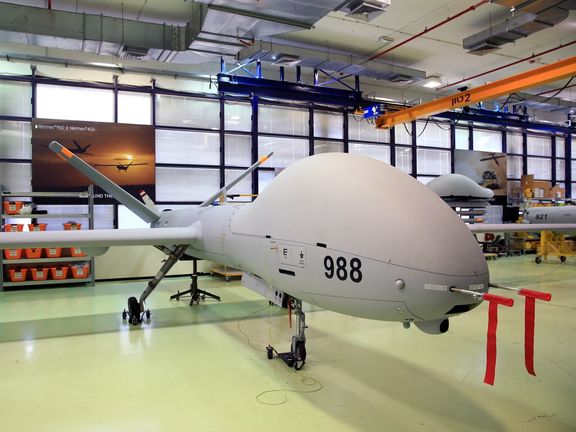
Large Israeli drones use gravity bombs of up to one ton that produce no noise or smoke, making them hard for enemies to anticipate or evade, the military says.

Large Israeli drones use gravity bombs of up to one ton that produce no noise or smoke, making them hard for enemies to anticipate or evade, the military says.
After more than two decades of secrecy, Israel in July went public with the existence of armed drones in its arsenal.
Briefing Reuters, a senior Israeli military officer said the armed drone fleet includes the passenger plane-sized Heron TP, made by state-owned Israel Aerospace Industries Ltd ISRAI.UK, and Elbit Systems Ltd's ESLT.TA smaller Hermes.
The former, the officer said, "is the heaviest drone that the IDF (Israel Defense Forces) has, which can carry munitions, with an effective payload of around a ton".
Such drones can be potentially used against hardened Iranian nuclear facilities in case Israel decides to carry out its threat of taking action to prevent Iran from developing nuclear bombs.
The Israeli manufacturers do not publicize the armed capabilities of the drones, under what industry sources have described as a Defense Ministry secrecy policy.
The officer, not identified in line with military requirements given the sensitivity of the subject, said any sales of bomb-capable drones would be government-to-government, negating the need for publicity.
All the drone munitions are Israeli-made, the officer said, and "come down in free-fall, and can reach the speed of sound".
Such bombs would not have propulsion systems that generate the tell-tale noise and smoke of fuel afterburners.
The officer declined to give further details on the munitions, saying only that, by design, when an armed drone attacks "no one will hear it, no one will see it coming".
This would assume enough altitude so that the drones' propeller engines cannot be clearly heard on the ground.
With Reporting by Reuters
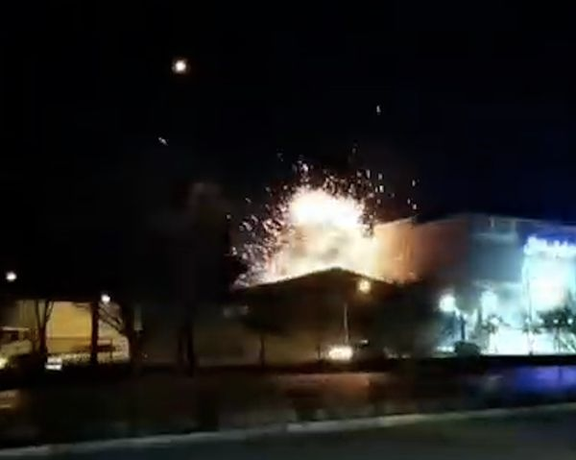
Islamic Republic says "equipment" used in the drone attack on the Ministry of Defense complex in central Iran last week was procured by Kurdish groups based in Iraqi Kurdistan region.
Nour News Agency, affiliated with the Iranian Supreme National Security Council (SNSC), claimed on Wednesday that parts of a micro aerial vehicle and explosive materials were ordered by a foreign intelligence service and smuggled into Iran from the Kurdistan region through difficult mountain passes and were handed to an intermediary in a border city in the northwestern part of the country.
The report added that the drone parts and explosives were then assembled at a modern workshop by a group of specialists and were used in the attack.
Nour News had earlier claimed that several members of a "Kurdish group" were trained by Israel for sabotage operations on the industrial facilities of Esfahan but were "arrested by the Ministry of Intelligence," a claim vehemently rejected by Kurdish groups.
The late-January attack targeted Material and Energy Laboratory of Esfahan with what the defense ministry called “small drones.” Videos citizens sent to Iran International showed an explosion, although the government claimed its air defenses had fended off the attack. Small or quadcopter drones, however, cannot fly hundreds of kilometers to reach Esfahan, located in central Iran. If indeed the attack was carried out with small drones, it would mean operators were present on the ground, in Iran.
According to the Israeli weblog Intellitimes, the target of the drone attack was the "Iranian Space Research Institute" affiliated with the ministry of defense. The Jerusalem Post, citing Western and foreign intelligence sources, also wrote that contrary to Iran’s claim the attack on "advanced weapons development" facility was a "tremendous success".
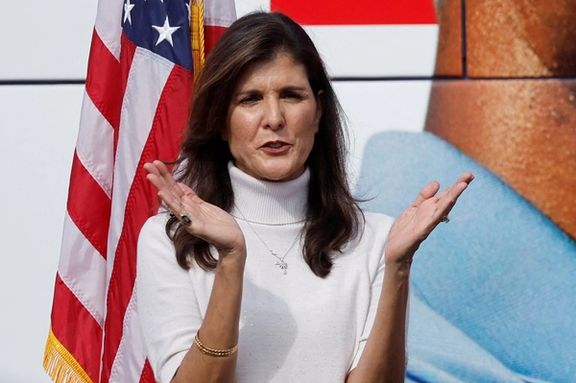
Former US ambassador at the UN Nikki Haley, who is a tough critic of the Iranian regime will launch her candidacy for the 2024 Republican presidential nomination.
Haley was ambassador when former President Donald Trump withdrew from the 2015 nuclear accord with Iran, known as the JCPOA and strongly defended the decision.
Haley, who was Governor of South Carolina, will face Trump in the primaries and mutual criticism will become inevitable, although she has refrained from speaking against the former president unlike John Bolton, Trump’s former national security adviser.
She has distanced herself from Trump several times, only to later soften her rhetoric toward the former president, saying he has an important role to play in the Republican Party.
The daughter of two Indian immigrants, Haley has gained a reputation in the Republican Party for her ability to address issues of gender and race in a more credible fashion than many of her peers. She has also pitched herself as a stalwart defender of American interests abroad.
Playing into Haley's hands may be geography: South Carolina is the third state to host the Republican nominating contest, and it often plays an outsized role in the race. Haley, who governed the state from 2011 to 2017, is popular there, polls show.
While she comes into the race as an underdog - most national polls show her support in the single digits - Haley is used to running from behind, having gained a reputation in political circles for coming out on top in tough-to-win races.
With reporting by Reuters
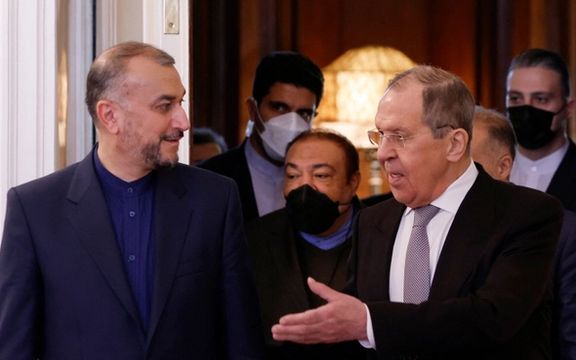
Commentators and former officials in Iran are increasingly warning about Tehran’s close cooperation with Moscow and its impact on the country’s isolation.
Former head of Iranian parliament's National Security and Foreign Policy Committee Heshmatollah Falahatpish told local media: "If it were not for the issue of sending Iranian drones to Russia to be used in the war in Ukraine, Europe was highly unlikely to ratify a resolution against Iran."
Falahatpisheh, who is one of the few domestic critics still allowed to speak to print media, further said he is worried that Iran might become the second front in Russia's war against Ukraine.
The conservative pundit explained that Europe and the United States had agreed [in March 2022] on two matters – Iran upholding its nuclear commitments and the West reducing sanctions imposed, but at the last moment Russian negotiator Mikhail Ulyanov said that Russia cannot take part in implementing the agreement because of US sanctions on Moscow.
"Later Russian Foreign Minister Sergey Lavrov said that Russia would sign the agreement only if all of Russia's nuclear, trade, and military dealings with Iran are exempted from the sanctions. This led to an impasse and the talks were suspended," Falahatpisheh said.
Meanwhile, in an interview with moderate proreform Rouydad24 website, Falahatpisheh charged that some Iranian officials behave in a way as if they are paid to speak against Iran's national interests.
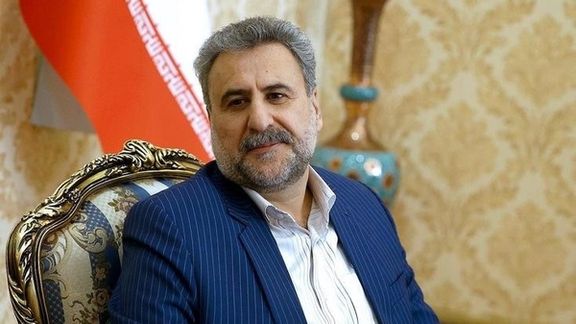
He added that "Statements made by a group of people who have no knowledge of foreign policy have only led to a catalogue of threats against Iran." He was probably referring to individuals such as ultraconservative presidential aide Saeed Jalili and his likeminded allies in the parliament particularly ultraconservative Paydary Party members who staunchly oppose the revival of the 2015 nuclear deal or effectively any agreement with the United States.
Meanwhile, accusing the Islamic Republic of weakening the political elites, Falahatpisheh charged that "Some of Iran's politicians have no proper definition of the government and mainly believe in running the country's affairs like a militia. They have no understanding of the concepts of government, development, international relations, détente, international economy and other political concepts. They do not care what will happen to the next generation of Iranians as a result of Iran's isolation. And that is dangerous."
Falahatpisheh argued that many of the sanctions against Iran are the outcome of such a political approach. "While Iran owns two third of the Persian Gulf waterways and it should naturally attach high importance to the waterway's security, some members of parliament and others threaten to close the Strait of Hormuz. The current situation of Iran and its isolation is a legacy of this kind of grandstanding."
He also said that measures such as sending drones to Russia leads to the IRGC being listed as a terrorist organization in the West rather than the Russian army.
In a related development, Ahmad Bakhshayesh, another former member of parliament's National Security and Foreign Policy Committee said in similar remarks that "The Iranian government believes creating a foreign enemy will lead to solidarity inside the country.”
Referring to the recent drone attack on a military installation in Esfahan, Bakhshayesh said: "Benjamin Netanyahu creates foreign crises as a way of dealing with political divisions inside Israel." Meanwhile, he charged that "the attack was done by Israel from the Republic of Azerbaijan as part of Israel's confrontation with Iran as a country that harasses Israel by its presence in the Golan Heights and its support of the Lebanese Hizballah."
Bakhshayesh added that Iran has recently armed [its proxy groups] in the West Bank, in an area only 15 kilometers away from Israel. He characterized this action as "creating permanent tension" in that region.
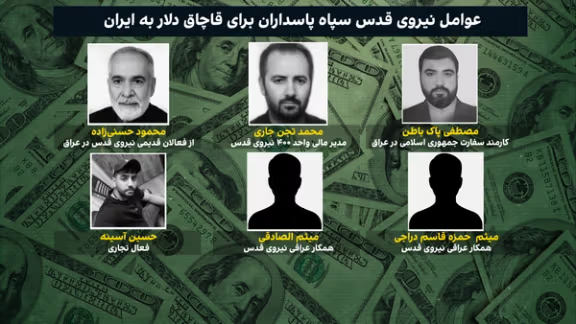
Iran International has obtained information that unravels some details about the inner workings of a Revolutionary Guard’s Quds force unit tasked with smuggling money from Iraq to Iran.
According to the information, the Islamic Republic’s embassy in Iraq is also involved in the money laundering operations that aim to funnel the regime’s revenues from oil and gas exports to Iran. As per a repeatedly extended sanctions’ waiver by Washington, Tehran is only allowed to import medicine and some essential goods in exchange for its export to its neighboring country.
Iran International television revealed that Mohammad Tajan-Jari, the financial manager of the 400th unit of IRGC’s Quds Force, was in charge of transferring the funds to the unit’s account in a branch of Ansar Bank in the capital Tehran. The bank had been founded by the IRGC in 2010 and was officially merged into the IRGC’s official Bank Sepah. The IRGC had established several banks and credit institutions to help it in its money laundering operations and circumvent US sanctions but after they served their purpose and their affiliations were disclosed, all of them, including Ansar Bank, Mehr Eghtesad Bank, Hekmat Iranian Bank, Ghavamin Bank and Kowsar Credit Institution, were merged into Bank Sepah from 2018 to 2020.
In Iraq, the network is apparently managed by an old Quds Force operative identified as Mahmoud Hasanizadeh, who oversees the job with the help of two Iraqi citizens. Tajan-Jari's executive officer in Iraq is Mostafa Pakbatan, an employee of the Embassy of the Islamic Republic and a member of the Quds Force, who receives the dollars from exchange offices in Iraq. He is not the only employee of the embassy involved in the money laundering network. The current ambassador, Mohammad-Kazem Al-e Sadegh, who was appointed to the post less than a year ago was also a commander of the Quds force and one of the close aides to former chief Qassem Soleimani, who was killed by a US drone strike in January 2020 in Baghdad.
About a year ago, during the tenure of Iraj Masjedi as the ambassador of the Islamic Republic, Al-Arabiya published a document that showed more than 60 billion Iraqi dinars (about $40 million) from the assets of Iranian energy companies were deposited into the account of the Iranian embassy in the Trade Bank of Iraq, which was supposed to be used for the expenses of the embassy. However, it ended up in the hands of Quds force officers.
This financial network is bypassing the US sanction regimes at the cost of the Iraqi economy. An informed source in Baghdad told Iran International late in December that Washington has received reports that Iraq is still conducting trade with Iran using US dollars despite sanctions.
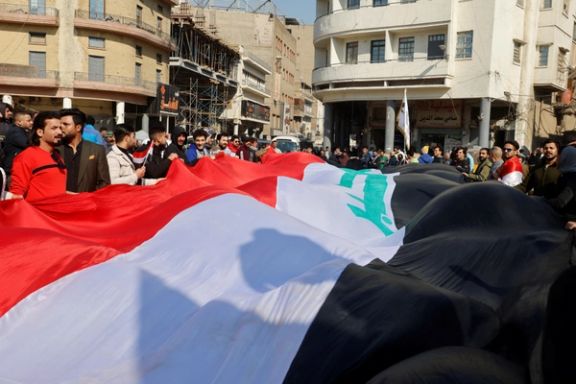
According to a report by London-based newspaper Asharq Al-Awsat, the decline in the value of Iraq’s national currency and the accompanying price increases for foodstuffs and imported goods can be traced back to remarkable change in the policy adopted by the US Treasury and the Federal Reserve Bank of New York. The impact of US banking sanctions on Iran has affected neighboring Iraq, weakening its currency and leading to protests against the government.
The dinar went into a tailspin against the dollar after the New York Federal Reserve imposed tighter controls on international dollar transactions by commercial Iraqi banks in November to halt the illegal siphoning of dollars to Iran.
Under the curbs that took effect this month, Iraqi banks must use an online platform to reveal their transaction details. But most private banks have not registered on the platform and resorted to informal black markets in Baghdad to buy dollars.
This has created dollar shortages as demand has outstripped supply and accelerated the dinar's fall against the greenback. Last week, hundreds of Iraqis demonstrated near central bank headquarters in Baghdad to protest at the recent slide of the Iraqi dinar against the dollar that has triggered a rise in prices of imported consumer goods.
Following demonstrations a delegation of Iraqi officials is set to travel to Washington to resolve issues related to US banking restrictions.

Problems with Iran have gotten worse in the past two years despite talks over its nuclear program, US Special Envoy for Iran Rob Malley told the BBC’s Hard Talk.
Asked If he would acknowledge that the two-year diplomatic effort has failed, Malley said, “Diplomacy never ends as we do other things,” adding that the Biden administration has added sanctions, tried to contain Iran in the region and “mobilized the international community.”
However, he acknowledged that relations with Iran have worsened since the Biden administration came to office and started indirect talks with Tehran in April 2021.
The negotiation ended in deadlock in September, as US said Iran presented “extraneous” demands.
Pressed to acknowledge if the 2015 nuclear accord known as the JCPOA is dead, Malley avoided a direct answer, saying that Iran “turned down multiple opportunities to end this crisis…so you could reach your own conclusion.” He reiterated that the US is willing to continue talks with Iran “to reach a diplomatic outcome.”
Following the brutal and deadly suppression of protests in Iran many US politicians and Iranian activists have demanded an official end to the talks aimed at reviving the JCPOA, abandoned by former President Donald Trump in 2018.
Iranian activists have been demanding Malley's resignation, seeing him as an advocate of unending talks with the Islamic Republic, instead of opting for more pressure.
Malley reiterated that diplomacy is still the priority for the administration and a military option is only “a last resort,” apparently meaning to stop Iran from building a nuclear weapon. He added that the military option “is a very difficult option, a very dangerous option that President Biden would not engage in cavalierly.”
On the issue of how long the administration is willing to continue diplomacy with Iran when a point comes that it seems useless, Malley confirmed that the US has been sending “messages to Iran, but let’s not overstate,” and call it negotiations. He insisted that the US needs to convey messages, including about possible consequences if Iran supplies ballistic missiles to Russia.
When asked, Malley did not deny an Iran International report recently that he held three meetings with Iran's ambassador at the United Nations.
Asked if expanding close US and Israeli military cooperation and large joint military exercises are aimed at sending a message to Iran, Malley said these steps are designed to show that the US “has Israel’s back and we will work with Israel,” on protecting shared interests. He also said the drills aimed to demonstrate that regardless of what is happening in Europe “we could do other things, we could mobilize to defend our interests.”
In responding to a question if the administration is “compartmentalizing” its policy toward Iran, in terms of separating the nuclear issue from the gross violations of human rights, Malley said, “There is a degree to which we have to, in the sense that we can do two things,” support the people in Iran and defend the US national interest in not allowing Iran to go nuclear. He added “there is no contradiction between these two.”
The US envoy also defended the administration’s efforts in supporting the protest movement in Iran, citing frequent statements by President Joe Biden and his top officials and mobilizing international support to expel Iran from the UN Commission on the Status of Women in December. However, Malley reiterated that US “is not in the business of regime change.”
Malley praised the convergence of positions with Europe regarding Iran and said Tehran had a clear choice of returning to its obligations under the JCPOA, and to stop supporting Russia in its war against Ukraine. He added that US is not asking something “tantamount to surrender” but a “realistic choice, which is in their hands.”